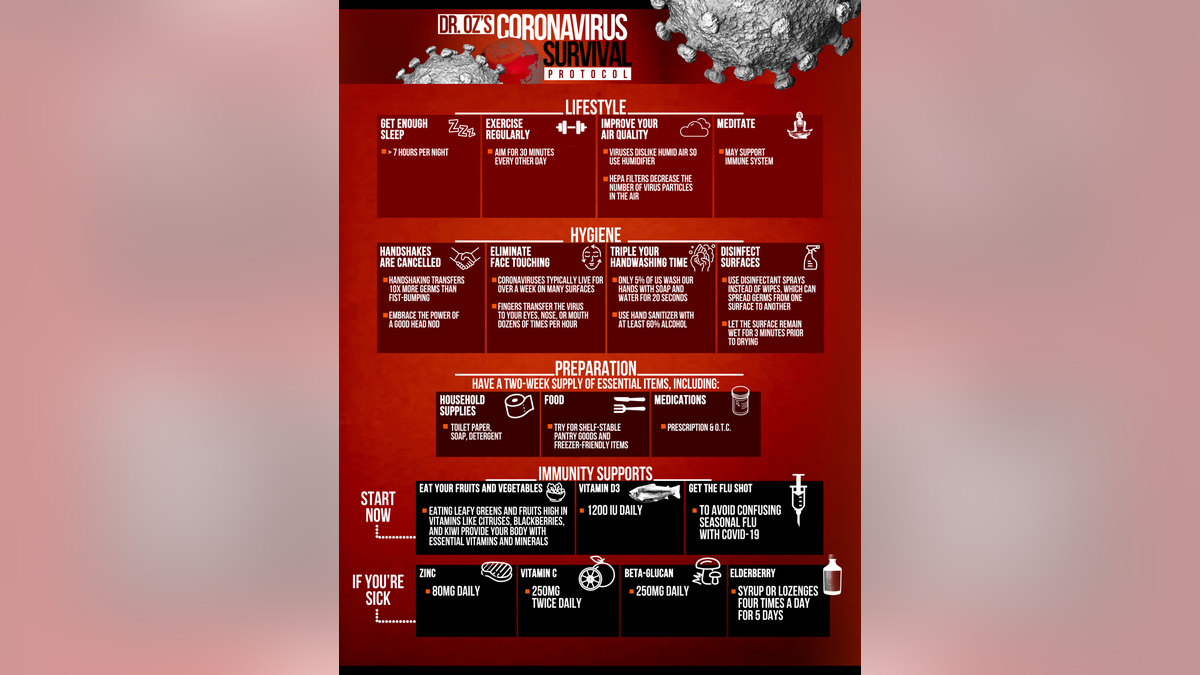Dr. Oz answers your questions about coronavirus
'Dr. Oz Show' host Dr. Mehmet Oz joins Harris Faulkner to discuss the coronavirus outbreak on 'Outnumbered Overtime.'
We are a can-do people and have mobilized for crises in the past. We thrive on clear insights with a game plan to follow while our health leadership catches up with the rapidly moving coronavirus.
Nevertheless, events are being canceled, Italy is on lockdown and officials are debating whether or not to call the coronavirus a pandemic. America can’t stop watching or talking about the threat, but what you really need to know is how can I protect myself and my family from this novel infection.
You’re also probably worried, and that’s ok. There is still a lot of uncertainty about COVID-19 and no shortage of frightening news during the “fog of war," but it’s important to know that public health experts have been dealing with and preparing for similar situations for years, and there is a lot we know you can do right now. Here are your action steps to survive the coronavirus.
WHITE HOUSE TAKING 'COMMON-SENSE STEPS' TO CURB CORONAVIRUS RISK AT MEETINGS: OFFICIALS
First, good hygiene works.
Viruses like the novel coronavirus are spread through tiny droplets that your body makes when you cough, sneeze or talk. The virus can travel in these liquids and enter your body through your nose, mouth, or eyes. This most likely occurs when the virus gets on your hands and you then touch your face.
The average person touches his or her face dozens of times per hour. Now more than ever it's important to wash your hands. Use soap and water and wash for at least 20 seconds and be sure to wash your fingers and fingertips—that’s what surgeons do before they go in the operating room. Also avoid touching your face, especially if you’ve been out in public.
Finally, it’s time to cancel handshakes. It can feel awkward and anti-social, but handshakes transfer 10 times more germs than fist bumps. Better yet is to go with a guy nod for now.
Next, keep your distance.
Good hygiene can greatly reduce your chance of getting infected, but droplets can also travel about six feet through the air. That’s why officials are canceling classes and events. So at least until we have a vaccine or antiviral, you should keep people an arm's length away. This is especially true for people over 60 who have chronic illnesses.
While 80 percent of people who get the coronavirus will have mild illness, older individuals especially those with common chronic conditions like heart disease, hypertension, diabetes and COPD are at the greatest risk for complications. People in this category should avoid both crowds and travel. And since just about all of us have someone in this category we love, we should adopt these cautions to help protect them.
If you live in an area that has community spread, which is now many parts of the country, consider video chats instead of in-person visits temporarily.
More from Opinion
Be prepared.
You’ve heard about the shortage of hand sanitizer and masks and the long lines at markets. Some reporters have called this a sign of panic, but I look at this as a sign of American resilience.
Being prepared is one of the most proactive things you can do in the face of uncertainty. There is no need to start hoarding but having two week's worth of foods like wholes grains, beans, and frozen vegetables, supplies like soap and toilet paper, as well as a month’s supply of medications is smart.
CLICK HERE TO GET THE OPINION NEWSLETTER
Support your immune system.
While we don’t have treatments for COVID-19, there is plenty you can do to keep your body in top physical condition. First, be sure to get at least seven hours of sleep, which can decrease your risk of getting a cold. Eat your leafy greens and other vegetables, which are loaded with immune-supporting vitamins and minerals as well as antioxidants. Get some sun or consider 1200IU Vitamin D a day, which is associated with decreased incidence of upper respiratory tract infections.
If you feel sick.
While the government has promised that anyone who wants to get tested for the virus can, tests are actually in short supply. The truth is, that while the test may be helpful for scientists studying the spread of the virus, at this point it won’t be much help to you, because there is no treatment.
CLICK HERE TO GET THE FOX NEWS APP
As the number of people infected increases, the public health strategy will have to move from containment to social distancing. That’s why the best thing you can do if you feel sick is to stay home like you should if you had a bad cold, but this time really stay home. If you feel worse than a cold or have trouble breathing call your doctor right away. Zinc lozenges, vitamin C and elderberry syrup have also been studied and may help reduce illness duration of colds. We have all the details, including dosages, on our coronavirus survival protocol one sheet that we culled from the best advice from world experts, now available on our all my social media feeds.

In the coming weeks, we will continue to learn new information, see more infections and increased directives for social distancing designed to keep us safe New things are always scary, but Americans are best in the face of adversity. Armed with knowledge and support we will get through this and be stronger. And remember the best cure for panic is kindness.






















